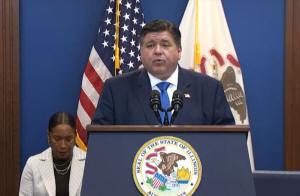Tax rebate checks begin going out this week
 Send a link to a friend
Send a link to a friend
[September 13, 2022]
By PETER HANCOCK
Capitol News Illinois
phancock@capitolnewsillinois.com
 SPRINGFIELD – Gov. JB Pritzker announced
Monday that Illinois taxpayers will soon start receiving rebates of
their income and property taxes, either in the mail or by direct bank
deposits. SPRINGFIELD – Gov. JB Pritzker announced
Monday that Illinois taxpayers will soon start receiving rebates of
their income and property taxes, either in the mail or by direct bank
deposits.
Speaking at a news conference in Chicago where he was flanked by other
state officials and Democratic leaders of the General Assembly, Pritzker
said the rebates are intended to help soften the impact of rising
inflation and high gasoline prices.
“Everyone knows inflation is a global problem with local consequences,”
he said. “Prices at the pump and at the supermarket have taken Illinois
families on a rollercoaster ride over the past months. It's exactly the
kind of thing that responsible government should help our residents
with, and we have.”
Those rebates, totaling about $1.2 billion, were part of a larger, $1.8
billion tax relief package that lawmakers included in the budget they
passed this spring.
Individual income taxpayers who earn less than $200,000 who are not
claimed as a dependent on someone else’s taxes will receive a rebate of
$50. That goes up to $100 for couples filing jointly who earn less than
$400,000. Tax return filers will also receive $100 rebates for each
dependent they claim, up to a maximum of three dependents.

Homeowners who were able to claim the property tax credit on their 2021
tax returns will receive an additional rebate equal to the credit they
claimed, up to a maximum of $300. Those rebates will go to filers who
earned less than $250,000, or $500,000 for a couple filing jointly.
No further action is needed from eligible Illinoisans who filed tax
returns in 2021, otherwise, more information can be found at
tax.illinois.gov/rebates.
Pritzker’s office said the payments will take “at least eight weeks to
be issued in total.”
In addition to those measures, the tax relief package also included a
six-month pause, through Dec. 31, of the automatic inflation-based
increase in the state motor fuel tax; a one-year suspension of the
state’s 1 percent grocery tax; and a sales tax holiday on back-to-school
merchandise that ran Aug. 5-14.
[to top of second column]
|

Gov. JB Pritzker announces that the
state has begun distributing the income tax and property tax rebates
that were part of a $1.8 billion tax relief package in the state's
current fiscal year budget. (Credit: Blueroomstream.com)

The package also included a permanent expansion of the state’s earned
income tax credit, raising it from 18 percent to 20 percent of the
federal credit and extending eligibility for that credit to noncitizens
who file taxes using an individual taxpayer identification number
instead of a Social Security number.
“The expansion of the earned income tax credit is a huge deal for
Illinoisans who are emerging in this state and trying to make their
way,” said state Rep. Michael Zalewski, D-Riverside, who chaired the
House Revenue Committee. “And we expanded it this year. And we are on
our way to a fairer tax code through existing law, which is incredibly
exciting for the state of Illinois.”
Republicans criticized that package as an election-year gimmick, noting
that the rebate checks would show up in people’s mailboxes or bank
accounts just before Election Day, while the pause on the motor fuel tax
hike would disappear soon after Election Day.
Yet nearly all in the GOP voted in favor of the tax relief package,
which passed 55-1 in the Senate and 110-0 in the House with four
“present” votes.
Pritzker defended the timing of the rebate payments during the news
conference.
“We passed it back in the spring, that's when you pass a budget. And it
went into effect at the beginning of the fiscal year, that's July 1,” he
said. “It takes some time. The comptroller only just got enough paper –
think about the supply chain issues – in order to be able to issue the
checks. And then, of course, you've got to make sure you've got the
reserves of $1.2 billion to send out to people when you're sending the
checks out. So that's why it takes a little time.”
Capitol News Illinois is a nonprofit, nonpartisan news
service covering state government that is distributed to more than 400
newspapers statewide. It is funded primarily by the Illinois Press
Foundation and the Robert R. McCormick Foundation.
 |